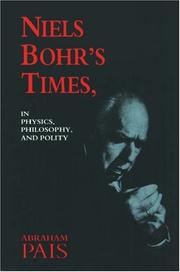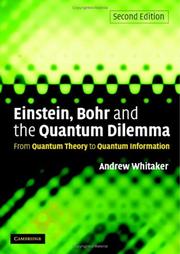| Listing 1 - 10 of 19 | << page >> |
Sort by
|
Book
Year: 1955 Publisher: Oxford: Pergamon,
Abstract | Keywords | Export | Availability | Bookmark
 Loading...
Loading...Choose an application
- Reference Manager
- EndNote
- RefWorks (Direct export to RefWorks)

ISBN: 0198520484 9780198520481 Year: 1991 Publisher: Oxford : Clarendon,
Abstract | Keywords | Export | Availability | Bookmark
 Loading...
Loading...Choose an application
- Reference Manager
- EndNote
- RefWorks (Direct export to RefWorks)
Abraham Pais's life of Albert Einstein was one of the finest scientific biographies ever written. When it first appeared in 1982, Christian Science Monitor called it "an extraordinary biography of an extraordinary man," and Timothy Ferris, in The New York Times Book Review, said it was "the biography of Einstein he himself would have liked best," adding that "it is a work against which future scientific biographies will be measured." As a respected physicist himself, Pais was the first biographer to give Einstein's thinking its full due, yet despite the occasional high level of science needed to discuss Einstein's ideas, the book was a national bestseller. Indeed, it was one of The New York Times's Best Books of the Year, and the winner of the 1983 American Book Award for Science. Now Pais turns to Niels Bohr, to illuminate the life and thought of another giant of 20th-century physics. Bohr was the first to understand how atoms were put together, he played a major role in shaping the theory of the atomic nucleus, he decoded the atomic spectrum of hydrogen, an achievement which marks him as the founder of the quantum dynamics of atoms, and his concept of complementarity (which provides the philosophical underpinning for quantum theory) qualifies him as one of the twentieth century's greatest philosophers. Pais covers all of these achievements with sophistication and clarity, but he also reveals the many other facets of the man. Perhaps most important, he shows that Bohr was not only a great scientist, but also a great nurturer of young scientific talent, acting as father figure extraordinaire for several generations of physicists. Bohr's Institute of Theoretical Physics, which he founded in Copenhagen and for which he tirelessly raised funds, was the world's leading center for physics all through the 1920s and 1930s, the birthplace of Heisenberg's papers on the uncertainty relations, Dirac's first paper on quantum electrodynamics, and other pivotal works. And
Nuclear physics --- History. --- Bohr, Niels Henrik David, --- Bohr, Niels --- Physique nucléaire --- Histoire --- Bohr, Niels,
Book
ISBN: 9780471612087 0471612081 Year: 1989 Publisher: New York (N.Y.): Wiley,
Abstract | Keywords | Export | Availability | Bookmark
 Loading...
Loading...Choose an application
- Reference Manager
- EndNote
- RefWorks (Direct export to RefWorks)
Topological semigroups --- Representations of semigroups --- Bohr compactification
Book
Year: 1958 Publisher: Paris: Gauthier-Villars,
Abstract | Keywords | Export | Availability | Bookmark
 Loading...
Loading...Choose an application
- Reference Manager
- EndNote
- RefWorks (Direct export to RefWorks)
Book
ISBN: 0674624157 9780674624153 Year: 1985 Publisher: Cambridge Harvard University Press
Abstract | Keywords | Export | Availability | Bookmark
 Loading...
Loading...Choose an application
- Reference Manager
- EndNote
- RefWorks (Direct export to RefWorks)
Physics --- Physicists --- Physique --- Physiciens --- History --- Biography --- Histoire --- Biographie --- Bohr, Niels, --- -Physics --- -Natural philosophy --- Philosophy, Natural --- Physical sciences --- Dynamics --- Physical scientists --- Bohr, Niels Henrik David --- History. --- -Biography --- Bohr (Niels). --- Bohr, Niels Henrik David, 1885-1962 - Addresses, essays, lectures. --- Physics - History - Addresses, essays, lectures. --- Physicists - Denmark - Biography - Addresses, essays, lectures. --- Natural philosophy --- Boer, Niersi, --- Boerh, Niersi, --- Bohr, N. --- Bohr, Niels Henrik David, --- Bor, Nil's, --- Physics - History --- Physicists - Denmark - Biography --- Bohr, Niels, - 1885-1962
Book
ISBN: 044486914X 9780444869142 0444869387 9780444869388 Year: 1985 Publisher: Oxford : Elsevier,
Abstract | Keywords | Export | Availability | Bookmark
 Loading...
Loading...Choose an application
- Reference Manager
- EndNote
- RefWorks (Direct export to RefWorks)
Complementarity (Physics) --- Empiricism --- Metaphysics --- Complémentarité (Physique) --- Empirisme --- Métaphysique --- Bohr, Niels, --- Empiricism. --- Metaphysics. --- Ciencia --- Filosofia --- Empirisme. --- Métaphysique. --- Natuurkunde. --- Complementariteit. --- Filosofie. --- Complémentarité (physique). --- Complementarity (Physics). --- Nuclear physics --- Theories of Bohr, Niels --- Bohr, Niels Henrik David, --- Ciencia. --- Filosofia. --- Complémentarité (Physique). --- Theories of Bohr, Niels. --- Complémentarité (Physique) --- Métaphysique

ISBN: 2020510812 9782020510813 Year: 2001 Volume: S145 Publisher: Paris : Éditions du Seuil,
Abstract | Keywords | Export | Availability | Bookmark
 Loading...
Loading...Choose an application
- Reference Manager
- EndNote
- RefWorks (Direct export to RefWorks)
Quantum theory --- Théorie quantique --- History --- Histoire --- Bohr, Niels, --- Theorie quantique --- Théorie quantique --- Theorie quantique - Histoire
Book
ISBN: 1473661366 9781473661363 Year: 2018 Publisher: London: John Murray,
Abstract | Keywords | Export | Availability | Bookmark
 Loading...
Loading...Choose an application
- Reference Manager
- EndNote
- RefWorks (Direct export to RefWorks)
Every physicist agrees quantum mechanics is among humanity's finest scientific achievements. But ask what it means, and the result will be a brawl. For a century, most physicists have followed Niels Bohr's Copenhagen interpretation and dismissed questions about the reality underlying quantum physics as meaningless. A mishmash of solipsism and poor reasoning, Copenhagen endured, as Bohr's students vigorously protected his legacy, and the physics community favoured practical experiments over philosophical arguments. As a result, questioning the status quo long meant professional ruin. And yet, from the 1920s to today, physicists like John Bell, David Bohm, and Hugh Everett persisted in seeking the true meaning of quantum mechanics. What is Real? is the gripping story of this battle of ideas and the courageous scientists who dared to stand up for truth.
Quantum theory --- Influence (Literary, artistic, etc.) --- Quantum theory --- Bohr, Niels, - 1885-1962
Book
ISBN: 0521333202 9780521333207 9780511564307 9780521379274 Year: 1987 Publisher: Cambridge Cambridge University press
Abstract | Keywords | Export | Availability | Bookmark
 Loading...
Loading...Choose an application
- Reference Manager
- EndNote
- RefWorks (Direct export to RefWorks)
Complementarity (Physics) --- Wave-particle duality --- Physics --- Philosophy --- Bohr, Niels, --- -Wave-particle duality --- Dualism, Wave-particle --- Duality principle (Physics) --- Wave-corpuscle duality --- Electromagnetic waves --- Matter --- Radiation --- Wave mechanics --- Natural philosophy --- Philosophy, Natural --- Physical sciences --- Dynamics --- Quantum theory --- Constitution --- Bohr, Niels Henrik David --- Wave-particle duality. --- Philosophy. --- Complementarity (Physics). --- Boer, Niersi, --- Boerh, Niersi, --- Bohr, N. --- Bohr, Niels Henrik David, --- Bor, Nil's, --- Natuurkunde. Filosofie. --- Bohr (Niels). --- Physique. Philosophie. --- Physics - Philosophy

ISBN: 9780521671026 0521671027 9780511805714 Year: 2006 Publisher: Cambridge Cambridge university press
Abstract | Keywords | Export | Availability | Bookmark
 Loading...
Loading...Choose an application
- Reference Manager
- EndNote
- RefWorks (Direct export to RefWorks)
Quantum theory, the most successful physical theory of all time, provoked intense debate between the twentieth century's two greatest physicists, Niels Bohr and Albert Einstein. Quantum information theory has emerged from intensive study of the structure and interpretation of quantum theory to become one of the fastest growing areas of twenty-first century science. This second edition has been extensively revised and updated to cover recent developments, including the findings of papers published since the well-received first edition. A substantial new chapter is devoted to the development and structure of quantum information theory. Developments in the experimental and theoretical study of Bell's Theorem are also covered in detail, and the accounts of ongoing work have been brought up to date. A fascinating account of the development of quantum theory, this book will appeal to anyone with an interest in the fundamental questions of physics, its philosophy and its history.
Quantum theory --- Einstein, Albert, --- Bohr, Niels Henrik David, --- Quantum theory. --- Quantum dynamics --- Quantum mechanics --- Quantum physics --- Physics --- Mechanics --- Thermodynamics --- Bohr, Niels, --- Boer, Niersi, --- Boerh, Niersi, --- Bohr, N. --- Bor, Nil's, --- Einstein, Albert --- Aiyinsitan, Abote, --- Aĭnshtaĭn, Albert, --- Ainshutain, A, --- Ain̲sṭain̲, Ālparṭ, --- Ainsṭāina, Albarṭa, --- Ajnštajn, Albert, --- Āynishtayn, --- Aynshtayn, Albert, --- Eĭnshteĭn, Alʹbert, --- אינשטין, אלברט, --- איינשטיין --- איינשטיין, אלבערט, --- איינשטיין, אלברט --- איינשטיין, אלברט, --- Aynştayn, Elbêrt, --- Īnshtīn, --- Aynîştayn, --- Aiyinsitan, --- 愛因斯坦, --- 爱因斯坦, --- Einstein, Albert, - 1879-1955 --- Bohr, Niels Henrik David, - 1885-1962
| Listing 1 - 10 of 19 | << page >> |
Sort by
|

 Search
Search Feedback
Feedback About UniCat
About UniCat  Help
Help News
News